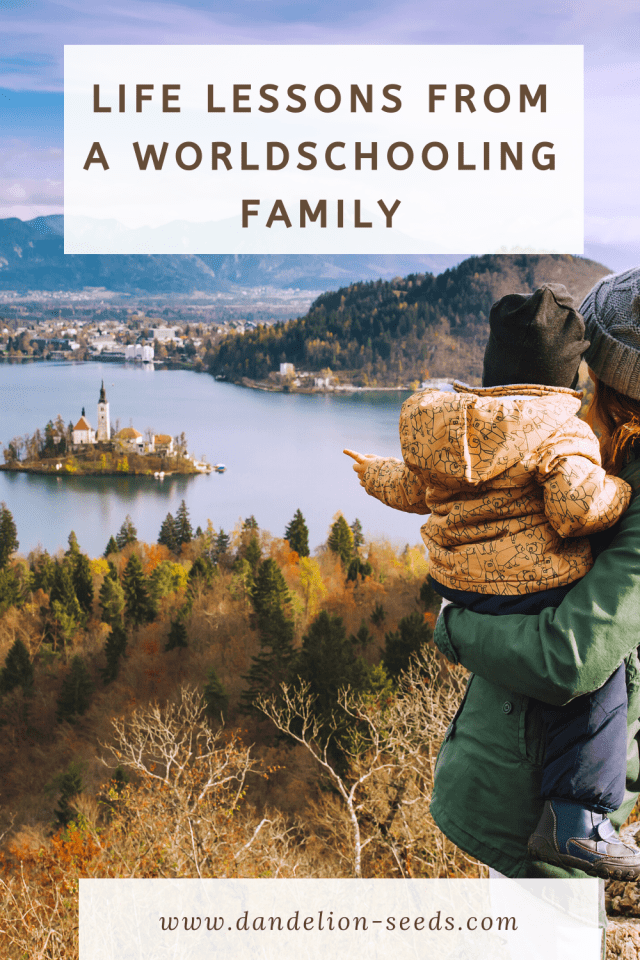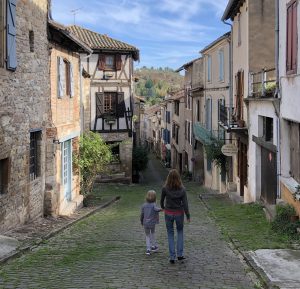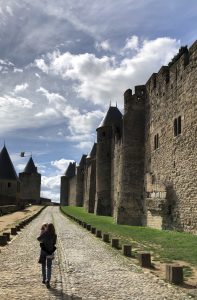
Sign in
Don't have an account with us? Sign up using the form below and get some free bonuses!

Worldschooling, or "world schooling" as some spell it, is a form of homeschooling wherein a family will spend time to travel the world and have that life experience be their children's primary form of education. Some families who world school still use curriculum to guide them, while others follow child-led learning. Some families leave public school altogether, while others take a gap year (or year off) for world travel.
That said, sometimes worldschooling happens without leaving the country. I know, for example, a family who rented an RV and toured each of the contiguous 48 states. Another family I know did the same across Europe. Some families pick a new location and stay put indefinitely. There's no one-size-fits-all approach to remote education.
Background: a couple of years ago, my husband, daughter, and I were on a flight home from seeing family on the other side of our home country (the United States). With five hours to spare on the flight, we came up with an extensive list of criteria of what we wanted our life to look like. My husband, in particular, had been feeling "stuck" but hadn't been sure what to do about it.
This conversation sparked something in our hearts, so we wanted to explore it further. Once we got home, my husband -- being the analytical fellow that he is -- put our criteria into a spreadsheet. From there, he started matching up places in the world that matched what we wanted. We'd both lived and worked abroad before so the idea of living internationally wasn't "foreign" to us (no pun intended). Our child was game to try it, too.
As fate would have it, my husband's corporate job was eliminated just a few months later. We weren't inclined to stay in the high-cost city we we'd been calling home, so suddenly, we had the perfect chance to really test out what we wanted out of life.
Life might've just handed us lemons, but we knew just what to do with them!
One month later, with all our worldly belongings in storage and using miles and travel points we'd accumulated over the years, we boarded a plane to Portugal (our first worldschooling stop). We brought only one suitcase each. For the next three months, we hopped from place to place across three European countries, changing location approximately once per week. Our original intent was to find one place and settle for awhile (much less jarring), but this is how it played out without much time for planning beforehand.
Doing this, we learned some really important life lessons.

I've always strived to raise my child to care about the Earth. Until we were essentially forced to live more simply while worldschooling, though, I hadn't realized what an extravagant lifestyle we'd been living at home. To be clear, "extravagant" is a very relative term. Case in point: I own exactly two pairs of yoga pants and three pairs of jeans. Still, compared to most people in the world, we had a lot of stuff. Traveling with just a single suitcase each showed us that yes, we'll be doing laundry more often and wearing the same clothes in a lot of our

photographs. That was about the only "drawback," if you can call it that.
We didn't bring an extra suitcase full of toys because we didn't need them (much less a whole playroom full of them). My child was content with a few of her special toys that we'd brought along on our journey.
Nor did we need a dryer to dry our clothes. Dryers are much less common in Europe (and many other parts of the world). We simply hung our clothes to dry and planned accordingly. As a small act, abandoning the dryer made me feel like I was taking better care of the planet. When we got back to the United States, a drying rack was one of the first things I purchased (afflink). I rarely use my dryer anymore.
Likewise, we didn't need hard copies of books; we read them online (and if you know me, you know I love "holding" a good book).
Furthermore, we had a lot less food waste. We were living in apartments and rental houses (not hotels), so we did all our own cooking. We bought only what we'd need for the week because we didn't want to throw away food that wouldn't travel well.
We changed our consumption in big and small ways. We came back to the U.S. "greener" than we were before, and we're not going back.

Worldschooling was the perfect way to learn how many people want to treat children really, really well. Be it the owner of the ice cream shop in Braga, Portugal, who learned my child's name and favorite ice cream flavor so that she could be sure to make it from scratch for the duration of our stay, to the baker in France who saw my child wasn't eating lunch so he came to our table with freshly baked chocolate cake for her -- people everywhere
cared.
I'm a pretty good judge of character; I could clearly tell they weren't in it for tourism points. My child often wasn't sure what to do with all the pats on the head, all the tender smiles, and all the genuine love she felt from those around us. People went out of their way to make her feel welcome.
Oftentimes, we didn't speak the same language as those around us, but their kindness came through loudly and clearly. THIS is the foundational knowledge I want my child to feel no matter where she is in the world. She saw and felt love and goodness everywhere. That's more important than anything I could possibly show her in a textbook.
Our child was able to hold a 10-line conversation with me in French after being in France for only a couple of weeks. Truth be told, I'd tried halfheartedly, and without much success, to teach her French when we were back at home -- and she hadn't had much interest. Here, though, she said she "just naturally understood" the

language. She felt invited, not by me but by her experience, to engage in her education this way. She learned plenty of other "school" lessons, too, along the way.
Seeing the world through children's eyes is an incredible gift. Every day, we'd venture somewhere new -- a castle, museum, historical site, or just a simple walk in nature surrounded by French countryside. Learning happens quite naturally when everything is novel. It makes our brain's synapses fire in new ways.
It's one thing to read about medieval times in books; it's another to walk through the history of a castle and see it firsthand. The lessons come quite naturally. I truly absorbed material I'd been "taught" many years ago in school; there's nothing like being there. For us as much as for our child, world schooling ignited (and renewed) a passion for learning.
Worldschooling was, as hard as it is to admit it, really one of the first times my child was able to fully connect emotionally with my husband. He'd always been working so many hours in his corporate job that he simply couldn't spend much time with her prior to now. Making up for lost time allowed them to heal, and build, a lot of their familial intimacy. It was equally helpful for my husband and me to reconnect emotionally, too, after years of being too busy. We stopped feeling buried in our phones and in our work. Worldschooling helped us reprioritize our family.
Although we didn't plan to worldschool in the way that it ended up happening, it convinced us that it's a match for our family. We'd be more intentional about it next time (and certainly wouldn't move from place to place every week). This wasn't simply an extended vacation; it was an investment in finding the life we truly desire.
This experience gave us, the parents, a deeper level of compassion and empathy for the human experience around us -- and fueled our desire to fully live more of our life. We're watching those sentiments unfold in our child, as well. We're all the better for it.
Sarah R. Moore is an internationally published writer and the founder of Dandelion Seeds Positive Parenting. You can follow her on Facebook, Pinterest, and Instagram. She’s currently worldschooling her family. Her glass is half full.
